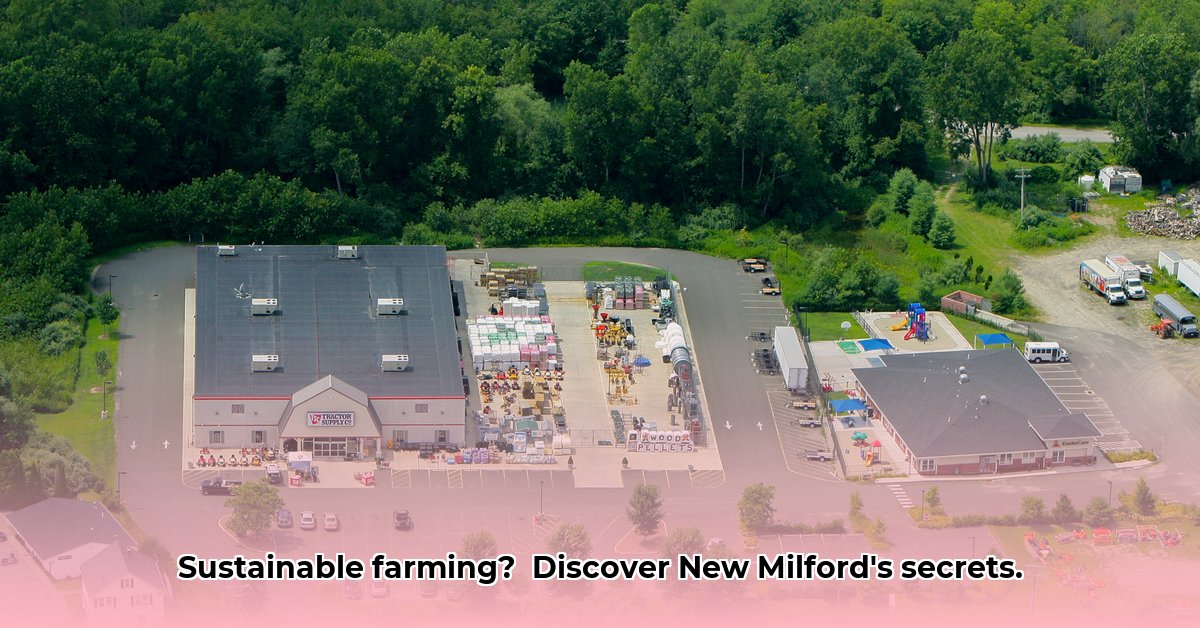
A Critical Examination of Tractor Supply's Role in Sustainable Agriculture
New Milford Tractor Supply (NMTS) occupies a unique position within its community. Serving as a primary supplier for both local farmers and home gardeners, its impact on sustainable agriculture warrants closer examination. This investigation assesses NMTS's contributions, identifies critical gaps in transparency, and proposes actionable steps to foster greater sustainability. For more specialized equipment, consider checking out specialty tractor options.
The Store's Stock and the Promise of Sustainability
NMTS offers a diverse range of products relevant to sustainable farming and gardening. These include fencing materials crucial for rotational grazing, livestock watering systems promoting efficient resource use, and organic gardening supplies. At first glance, this broad selection appears to support local food production and environmentally conscious land management. However, the lack of crucial information significantly limits the assessment of its true contribution.
Unanswered Questions: Transparency and Traceability
A significant shortcoming is the absence of detailed information regarding product sourcing and environmental impact. Critical questions remain unanswered: What are the origins of NMTS's products? Are any certified organic or fair trade? What is the carbon footprint associated with their supply chain? The lack of readily available data on product sourcing and certification (organic, fair trade, etc.) severely hampers a comprehensive evaluation of NMTS's contribution to sustainable practices. This opacity undermines trust and limits consumer ability to make informed, eco-conscious decisions.
Assessing NMTS's Local Impact: A Broader Perspective
Analyzing a single store like NMTS in New Milford provides only a limited perspective. A truly comprehensive understanding requires a broader analysis of Tractor Supply's entire operation. This necessitates examining its nationwide supply chain, including transportation methods, packaging materials, and overall environmental footprint. The current assessment is limited by its focus on a single store, necessitating further investigation across a larger scale. Can a single store truly represent the company's broader commitment to sustainability?
Actionable Steps: Moving Toward Greater Sustainability
Several stakeholders bear responsibility for bolstering NMTS's sustainability efforts.
For NMTS:
- Transparency Initiative: Conduct a thorough internal audit of its supply chain to determine the environmental impact of its operations. This audit should encompass product sourcing, transportation, packaging, and waste management. Publish this data publicly.
- Educational Outreach: Develop and implement educational programs – workshops, online resources, etc. – to promote sustainable farming practices within the community.
- Sustainable Sourcing: Prioritize partnerships with suppliers offering certified organic, fair trade, or other sustainably produced goods.
- ESG Reporting: Annually publish a comprehensive Environmental, Social, and Governance (ESG) report detailing sustainability goals, initiatives, and progress metrics.
For Local Stakeholders:
- Informed Consumerism: Demand transparency from NMTS regarding product sourcing and environmental impacts. Actively seek out and support businesses committed to sustainable practices.
- Community Collaboration: Farmers and home gardeners should actively participate in educational workshops and share best practices for sustainable agriculture. Local governments should incentivize sustainable farming through policy and collaboration with retailers like NMTS.
- Collective Advocacy: Local stakeholders could collectively advocate for greater transparency and sustainability initiatives at NMTS and similar businesses. Organized efforts can leverage greater influence.
Managing the Risks: Proactive Mitigation
Several risks threaten NMTS's sustainability goals:
| Risk Factor | Likelihood | Impact | Mitigation Strategy |
|---|---|---|---|
| Low consumer demand for sustainable goods | Moderate | Moderate | Market research to identify consumer preferences; targeted marketing to highlight environmental benefits; competitive pricing. |
| Supply chain sustainability challenges | High | High | Rigorous supplier audits; partnerships with certified sustainable suppliers; enhanced supply chain traceability. |
| Limited staff expertise | Moderate | Moderate | Invest in comprehensive staff training; collaboration with agricultural experts; access to online educational resources. |
| Competition from other retailers | Moderate | Moderate | Emphasize NMTS's commitment to sustainability; offer unique products and services tailored to sustainable practices. |
Conclusion: A Call for Transparency and Action
While NMTS possesses the potential to significantly support sustainable agriculture in New Milford, its current lack of transparency hinders a complete assessment. Achieving sustainable practices within the community requires a collaborative effort. NMTS must proactively enhance transparency, actively implement sustainability initiatives, and engage actively with the community. Only through collective action can NMTS fulfill its potential and contribute meaningfully to a more environmentally responsible future.